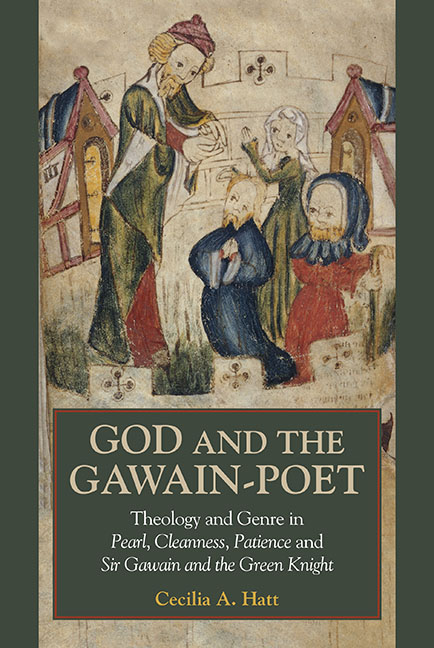 God and the Gawain-Poet
God and the Gawain-Poet Book contents
- Frontmatter
- Dedication
- Contents
- Preface and Acknowledgements
- Abbreviations
- Introduction: Signposts on the Trail of the Gawain-Poet
- Chapter 1 Pearl, the Jeweller’s Dream
- Chapter 2 The Difficulty of Cleanness
- Chapter 3 Patience and the Book of Jonah
- Chapter 4 Sir Gawain and the Green Knight: an Alternative Romance?
- Appendix: some Biographical and Contextual Speculations
- Select Bibliography
- Index
Chapter 2 - The Difficulty of Cleanness
Published online by Cambridge University Press: 07 May 2022
- Frontmatter
- Dedication
- Contents
- Preface and Acknowledgements
- Abbreviations
- Introduction: Signposts on the Trail of the Gawain-Poet
- Chapter 1 Pearl, the Jeweller’s Dream
- Chapter 2 The Difficulty of Cleanness
- Chapter 3 Patience and the Book of Jonah
- Chapter 4 Sir Gawain and the Green Knight: an Alternative Romance?
- Appendix: some Biographical and Contextual Speculations
- Select Bibliography
- Index
Summary
ALTHOUGH Pearl is the first poem in its section of MS Cotton Nero, and the first to be discussed in this study, there is a general assumption that Cleanness was actually the first of the four poems to be composed. The main reason for this may be that Cleanness initially strikes the reader as a less polished production than the others, uneven in its structure and inconsistent in its message. Cleanness is nevertheless a very powerful and impressive poem. It contains exciting scenes of cataclysmic disaster, vivid passages of descriptive chronicle, direct and earthy expressions of humorous contempt, a lovingly detailed account of delicate artwork and a tenderly affectionate central episode extolling the gentleness of Christ, but the fact is that modern readers tend not to like it very much. It will be the aim of this chapter to demonstrate that the poem's undoubted seriousness is directed not so much at the echoing of Scriptural condemnations as towards an interrogation of their textual nature and exploration of their implications for human moral and theological understanding.
Cleanness tells of the failures of humankind throughout Scriptural history, in the successive ages of nature, law and grace, to recognise God in creation and it describes the terrible disasters that divine judgement has called down as a result. It was until recently quite common to call the poem Purity, presumably for the sake of alliteration with Pearl and Patience. This has provoked an interpretation of it that is damagingly limited. Of course we have no definite warrant to call the poem Cleanness, but as it is the word the poet uses for this most complicated and multi-layered of concepts, it is at least as good as any other word, which purity is not. Purity, in modern parlance, overwhelmingly suggests the practice of sexual abstention, or at least of sexual continence, in accordance with the rules of a strict religious dispensation such as is not nowadays widely supported in modern Western society. The word also speaks of an opposition to dilution of any kind, a solipsism of the moral imagination and a disposition to enforce physical, mental and social boundaries at any cost.
- Type
- Chapter
- Information
- God and the Gawain-PoetTheology and Genre in <I>Pearl, Cleanness, Patience</I> and <I>Sir Gawain and the Green Knight</I>, pp. 73 - 123Publisher: Boydell & BrewerPrint publication year: 2015
